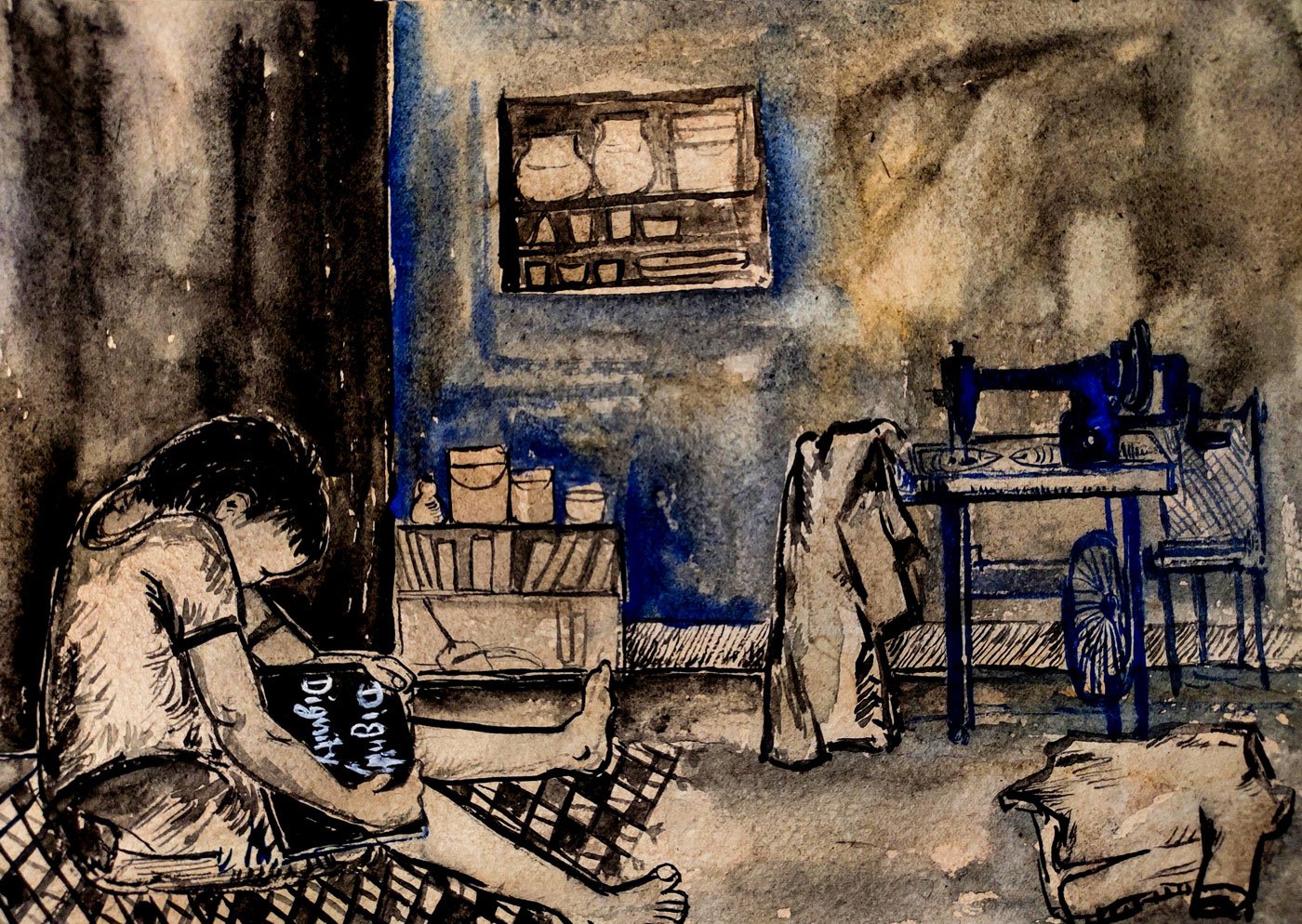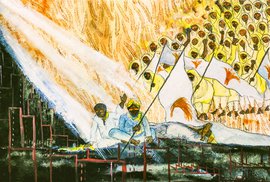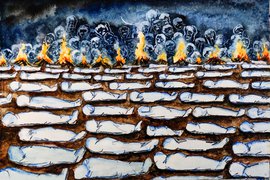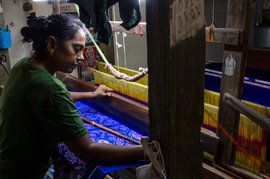Shantilal, Shantu, Tinyo: three names – same person. But maybe we go with a fourth one. In the dialect of Vadali village in Sabarkantha district, his name would become ‘Shontu’. So, let’s call him that.
Shontu is an exceptional character. Not in terms of adjectives like extraordinary, unique, famous. Rather, by virtue of being righteous, poor, downtrodden or Dalit – and thereby a character seen as enduring, suffering, disoriented. At times Shontu would seem completely non-existent. At other times, he would seem to be there as little as appropriate for a very ordinary human being.
He grew up with six of them – parents, an older brother and two sisters (one of them younger to him) – in dire poverty. The growing wants of the family had to be forever curtailed. Parents and elder siblings together made enough for two square meals. Father drove a matador ferrying goods, but took no extra passengers, and so brought no additional money. Mother was a daily wage labourer, who sometimes found work and sometimes didn’t. The fact that father was not a drunkard and there wasn’t much turbulence in the house was a blessing. But Shontu was to realise that only much later.
When Shontu was in Class 9 in Sharda High School in Vadali, a circus came to the village. But tickets were expensive. The school students, however, were offered tickets for five rupees each. Shontu didn’t have any money that he could take to school. “Stand up,” the teacher ordered. “Why haven’t you got the money, child?” She sounded affectionate. “Ma’am, my father is ill, and Ma has not got her wages yet from the cotton gin,” Shontu started weeping.
Next day his classmate Kusum Pathan gave him 10 rupees as a way ‘to seek blessings during Ramzan’. The following day she asked him, “What did you do with the money I gave you?” Shontu was earnest: “Five rupees I spent on the circus and five I lent at home to help with the expenses.” Kusum, Ramzan, Shontu and the circus – a benign world.
He was in Class 11 when their mud house had to be redone with bricks and cement, without the plaster though. That, they couldn’t afford. A single mason was hired on daily wages, and the rest of the work was done by his family. All this took a lot of time and before Shontu knew it, the final exams were upon him. He fell short in attendance. After pleading and explaining his situation to the headmaster, Shontu was allowed to take the exam.
He made it to Class 12 and pledged to do better. Shontu started working hard, but just then, mother fell ill. Her illness progressed rapidly, and she passed away just before his final exams. The loss, the pain, was all too much for the 18-year-old boy. He felt the pressure of the approaching exams, but no matter how hard he worked, it didn’t help. He got 65 per cent. Shontu began to give up on the idea of studying further.
He loved to read, and so he started going to the public library and bringing books home. Seeing his interest, a friend coaxed him into seeking admission in the Vadali Arts College for a bachelor’s degree in History. “You would get to read some great books,” he said. Shontu joined the course but went to the college only to pick up and return books from its library. The rest of the day he worked at the cotton gin. In the evening he read the books, and yes, loafed around. He scored 63 per cent in BA first year.
When his professor saw his results, he requested him to attend college regularly, and Shontu started enjoying his studies. It was his third year. The Arts College of Vadali decided to award a merit certificate to a student with excellent reading skills. Shontu claimed it. “When do you get the time, Shantilal, to go the library and pick up books?” his professor asked in bewilderment. Shontu passed his third year BA with 66 per cent in 2003.

Left: The street where Shontu's house stands. Right: He lives on the top floor the building. This was the house that the family had redone with bricks and cement when Shontu was in Class 11. The plaster that we see came much later
He went to Visnagar in neighbouring Mehsana district to pursue a master’s from a government college, staying in the hostel there. To secure a room, he had to score 6o per cent in the final exam. That was the requirement and he had met it with his score in the BA course. However, Shontu didn’t get a place in the hostel the next year, falling agonisingly short of that target, scoring 59 per cent in the first year finals.
He started travelling, an hour and a half each way between Visnagar and Vadali. That year, after Diwali, father had no work. Forget about the money to repay the loan he had taken from the bank for a tempo, there was not enough to eat. His elder brother Raju, with his tailoring work, tried to support the household’s expenses. Shontu felt increasingly reluctant to take favours from his brother now. He was irregular in college again.
He took up a job at the market, stuffing cotton into bags and loading those onto trucks, making 100 to 200 rupees a day. That March, he fell short on attendance again and wasn’t allowed to take the exam. A few friends intervened and he cleared his MA with 58.38 per cent. Shontu thought of doing an MPhil, but his fear of not having enough money was too great.
After a year-long break, Shontu filled out the required forms and gained admission at a government BEd college in Visnagar. Immediately, Rajubhai took a loan of 7,000 rupees at 3 per cent interest for him. As much as 3,500 rupees went into admission fees. Another 2,500 went towards fees for a compulsory subject – computers. Shontu was left with 1,000 rupees to take care of his other expenses. This was his third year of commuting to Visnagar for his studies.
All the time, he was aware of and troubled by his family’s financial difficulties. He even told Rajubhai that he wanted to discontinue his studies. “You better learn to live amidst financial constraints,” his elder brother replied. “Focus on your studies without worrying about home. In no time, this year will pass. And god willing, you may find a job after your BEd.” Brother’s words fuelled new hope in Shontu, and the slow coach of his education kept rolling through summer.
Come winter, father fell sick. His illness ate up all the income. Shontu was disturbed by the fact that Rajubhai had to bear the expenses of his education single-handedly. The BEd course taught him that education and expenses were great friends; one couldn’t exist without the other. Internships and working for Sarva Shiksha Abhiyan (the national programme for universal primary education), meant that he had to go to Bokarvada and Bhandu villages of Visnagar taluka for 10 days. Boarding was to be provided by Bokarvada Primary School, but the cost of lodging was the new problem. He didn’t want to bother Rajubhai. So, he borrowed 300 rupees from Mahendra Sinh Thakor in the admin office at the college.
“We asked the pujari from the village. He said that he could cook for us, but it would be 25 rupees a plate. We friends ate at the pujari ’s place for four days. I kept a fast for two days a week and saved 50 rupees,” Shontu recalls. After that, he had to spend another five days in the neighbouring Bhandu village, where they couldn’t arrange accommodation. That meant travelling back and forth from Bokarvada, spending an extra 10 rupees each way. Shontu borrowed another 200 rupees from Mahendra Sinh.
Food was arranged at the engineering college in Bhandu, but once again for 25 rupees a plate. Shontu kept a fast for two more days. Friends didn’t like it. “Shontilal,” one of them suggested, “we paid for five days in advance. You are the only one who pays after eating. When we all leave after having our food no one asks us for money. You also sit with us in the crowd and leave with us!” Shontu did that. “I listened to them and ate without paying money for the next few days,” says Shontu.
He was not very happy doing this, and despite all that, he still had to borrow 500 rupees more from his professor, H.K. Patel. “I will return this when I receive my scholarship amount,” he had said. Each day there were more expenses. They were even expected to spend on and serve refreshments to schoolteachers at Bhandu.
H.K. Patel summoned him one day to the staff room. “Your father is very ill,” he said as he handed him a 100-rupee note, “go home, quick.” At home, “everyone was waiting for me,” says Shontu. “They showed me his face and started preparing the body.” A huge crisis awaited his family. A 12th day ceremony was a mandatory custom to be observed on the death of a parent. That meant a minimum expenditure of 40,000 rupees.

The streets of Vadali that Shontu knows so well, which he traversed every time he went to school and later to college
They had not been able to do it when his mother passed away, so this time there was no getting away from it. A community meeting was called. Some senior residents of Vadali requested exemption. “The boys are young; a brother is still studying, and the other takes care of the household. Since all the responsibilities lie on one head, it won’t be possible for them to bear this expense,” they said. The family was saved from a huge financial calamity.
Shontu completed his BEd with 76 per cent and kept trying for a job. Meanwhile, the monsoon brought a dip in Rajubhai’s income. “I gave up the dream of a job and started working on the farms,” Shontu says. There were newly opened self-financed BEd colleges, but the merit of the applicants for teaching jobs there was very high. How could he hold his ground in front of them? Also, rampant corruption characterised the recruitments. All of it troubled Shontu.
After a while he decided to change track and try his hand at computers. He applied for a one-year diploma at the PGDCA Technical College in Vijayanagar, in his own Sabarkantha district. His name even appeared in the merit list. But Shontu had no money for the fees.
He met Chintan Mehta of Kothikampa, two kilometres away from Vadali. Mehta spoke to the college trustees and got them to adjust Shontu’s fees against a scholarship. The following day Shontu went to Vijayanagar. The clerk in the college office refused to oblige. “We are the ones who handle administration here,” he said. Due to non-payment of fees for three consecutive days, Shontu’s name got dropped from the merit list.
Shontu didn’t give up hope. He learnt from the clerk that the college had applied for extra seats. He sought permission to attend classes until those seats were approved. Permission was granted. With his admission still hanging in the air, he started commuting between Vadali and Vijayanagar – spending 50 rupees a day. Friends came to his aid. One of them, Shashikant, lent him 250 rupees for the bus pass. After repeated pleas, they got the clerk to put the office stamp on his concession pass for public transport. In the hope of getting admission to the course, Shontu continued to commute for a month and a half. But the college was not granted additional new seats. The day he learned of that, he stopped going.
Shontu began working as a farm labourer once again. After a month at a field in Morad village, he started tailoring work with Rajubhai – a small business by the roadside near the Repdimata Mandir of Vadali village. Then, three days before the full moon, Shontu ran into his friend Shashikant. “Shantilal, a lot of students who couldn’t understand what was being taught in class have left the PGDCA course halfway. The class is short of students, and you might stand a chance of getting back in there,” said Shashikant.
The following day, Shontu met the clerk in Vijayanagar again. The man demanded he pay the fees. Shontu paid him 1,000 rupees that he had earned working with Rajubhai. “I will do something about the remaining 5,200 rupees by Diwali,” he said, and secured his admission.
Fifteen days after his admission came the first internal exams. Shontu failed. He had not had any practice. His teachers advised him against wasting money as he had joined the course too late. They said that he would not be able to clear it. But Shontu did not abandon hope. Himanshu Bhavsar and Gajendra Solanki of Vadali, and Shashikant Parmar of Idar, helped him make up for what he had missed. He secured 50 per cent in the first semester exams. His teachers refused to believe what they had seen.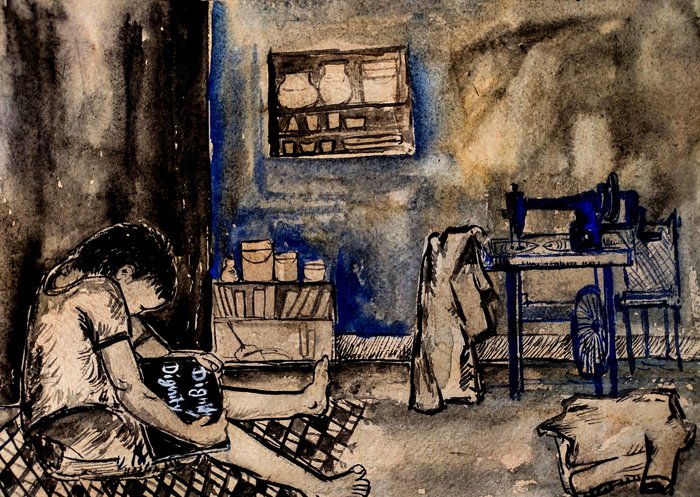
Shontu failed. He had not had any practice. His teachers advised him against wasting money as he had joined the course too late. They said that he would not be able to clear it. But Shontu did not abandon hope
Then fees for the second semester was 9,300 rupees. Shontu still had 5,200 pending from the previous semester, which made a total of 14,500 rupees. An impossible amount for him to pay. With requests and recommendations, his situation dragged on till the final exams of the second semester. But now the fees had to be paid. Shontu was stuck. He couldn’t see the way forward. Finally, he saw hope, a scholarship.
He met the clerk. He requested him to deduct his fees from the scholarship amount when it arrived. The clerk finally agreed – on one condition. Shontu had to open an account at the Vijayanagar branch of Dena Bank and hand over a signed blank cheque as a security deposit. Shontu didn’t have the 500 rupees needed to open a new back account.
He did have an account with Bank of Baroda, but with a deposit of just 700 rupees, the bank refused to issue him a cheque book. He explained his situation to an acquaintance, Rameshbhai Solanki. Rameshbhai trusted Shontu’s words and lent him a blank cheque from Dena Bank with his own signature on it. Shontu deposited the cheque in the college and was then allowed to take his exams.
He scored 58 per cent in the finals conducted by Hemchandracharya University of North Gujarat. But he was never given a marksheet.
Shontu applied for a job, hoping to get his marksheet before a call letter arrived, but he did not. The marksheet was held up till his scholarship got approved and his fees were paid. Shontu did not go for the interview as he didn’t have the original marksheet with him, which was a requirement.
He began working at a newly started ITI college at Idar in Sabarkantha for a remuneration of 2,500 rupees a month on the condition that he would present his marksheet in a month’s time. But over a month later, the marksheet hadn’t arrived. When he inquired at the Social Welfare Department office, he learnt that the scholarship amount had already been transferred to the college. Shontu visited Vijayanagar and spoke to the clerk. The clerk told him that the grant had been received but only when it was approved by the college could his fee be deducted from it. And only after that he could get his marksheet.
Shontu requested him to return the blank cheque signed by Rameshbhai. “You will get it,” was the clerk’s offhand response and he asked him not to come back. “Call me and tell me your account number,” he said. Shontu called the clerk on an idle day that fell between Diwali and New Year. “In which bank did you say you hold your account?” the clerk asked. “Baroda Bank,” said Shontu. “You have to first open an account with Dena Bank,” the clerk replied.
Shontu finally found work in Sarva Shiksha Abhiyan and, since June 2021, is on a 11-month contract at BRC Bhavan Khedbrahma, in Sabarkantha district. He is presently working as a data entry operator cum office assistant, drawing a salary of 10,500 rupees.
This story is adapted from Maati, the author’s creative non-fiction collection in Gujarati .